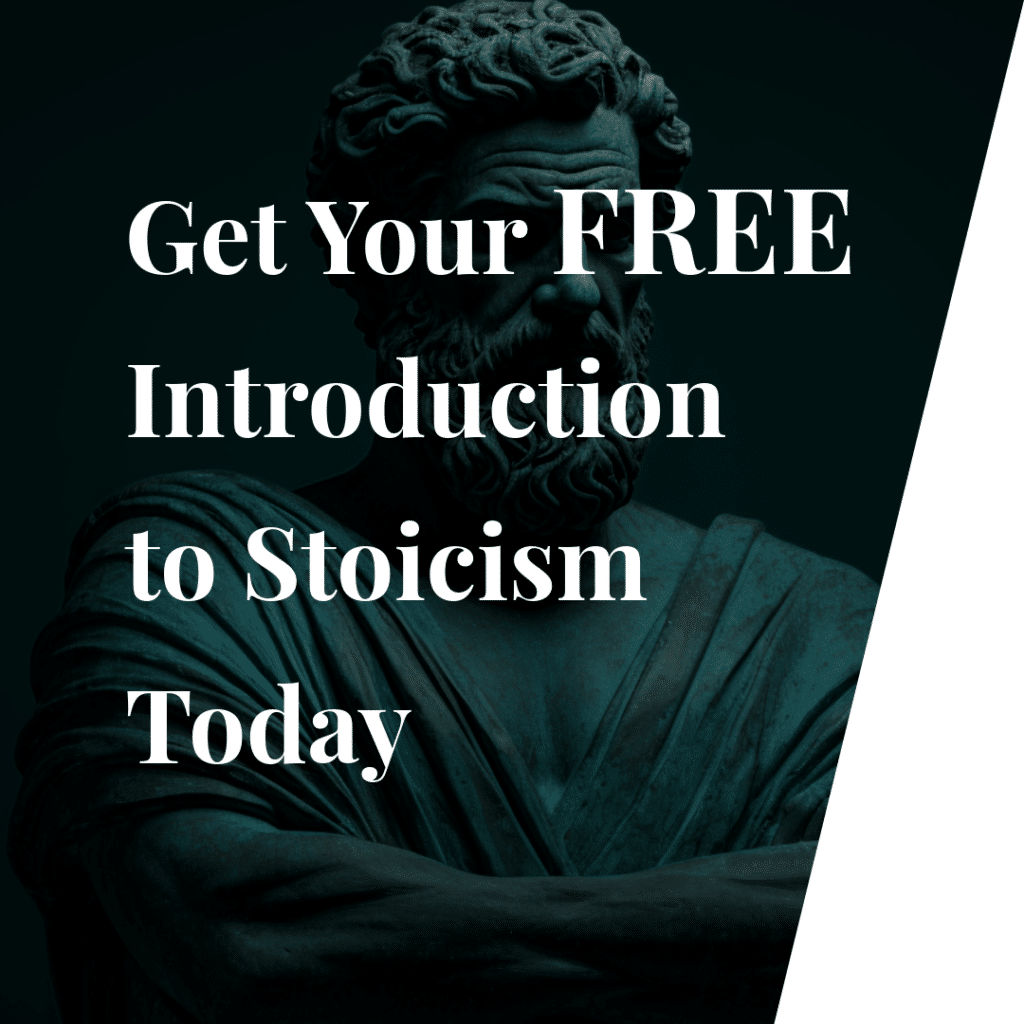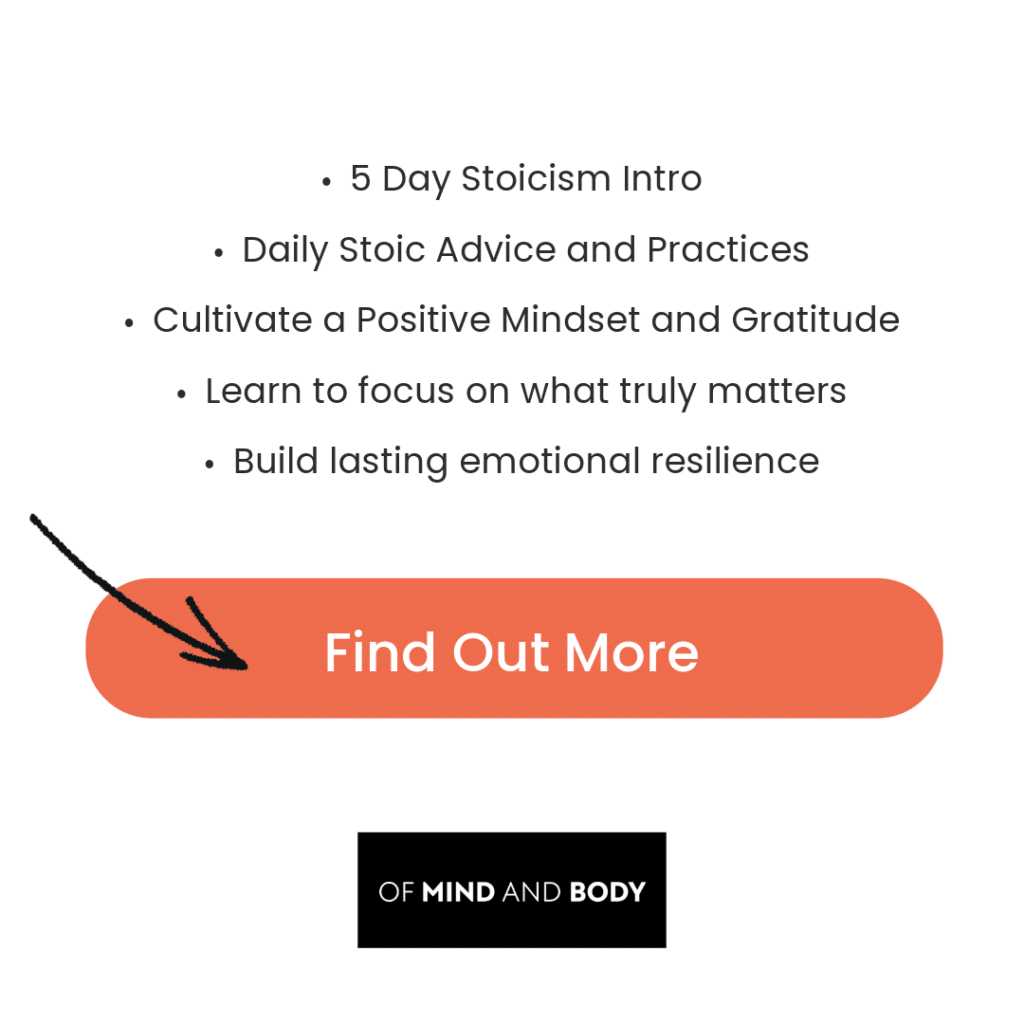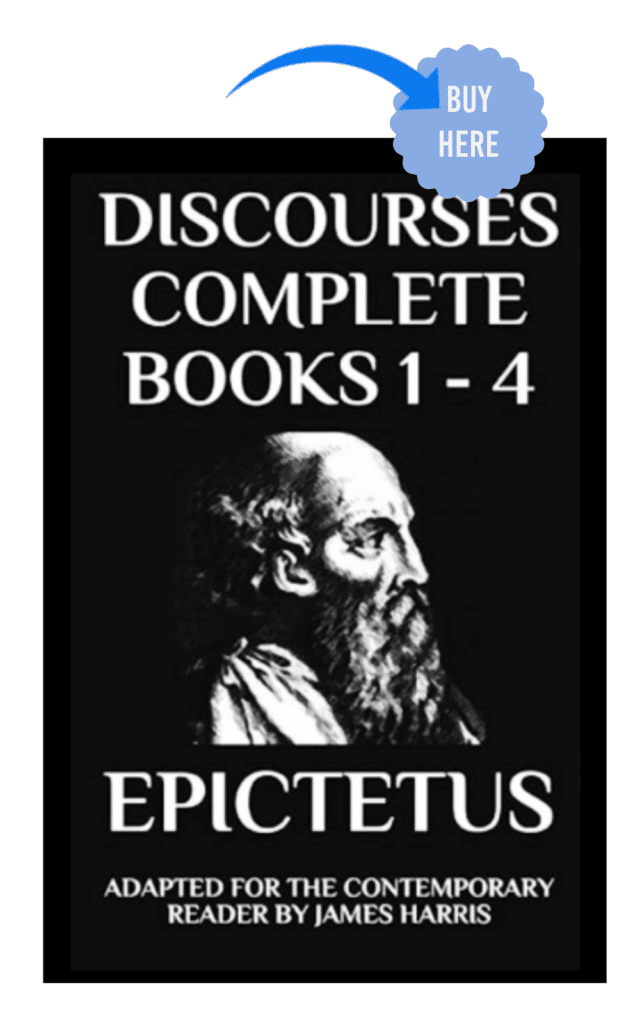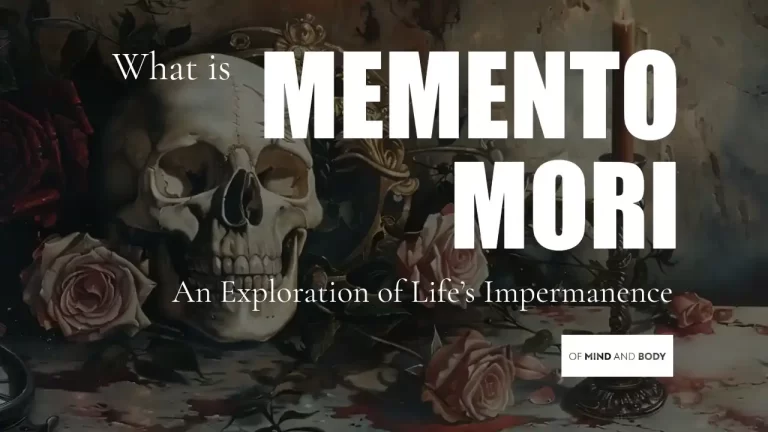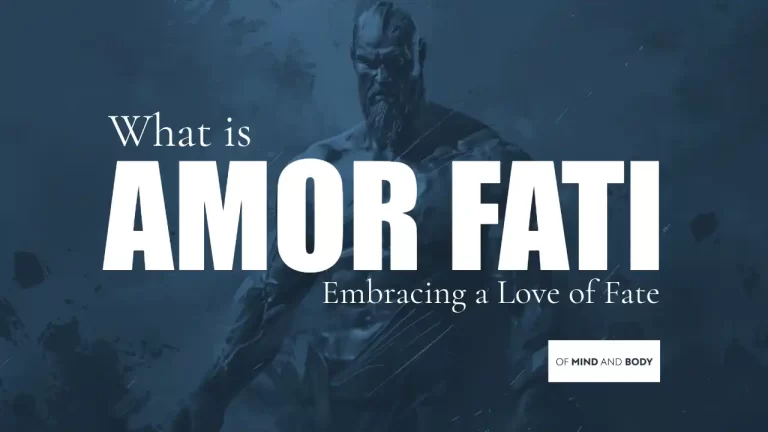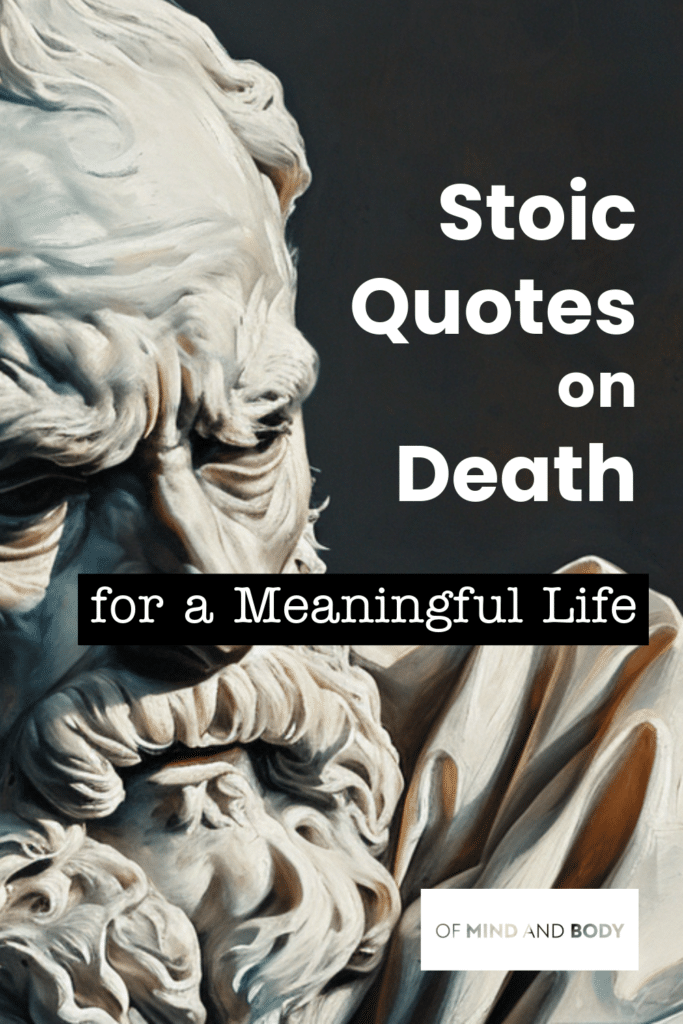
In the face of life’s ultimate certainty, death, the ancient Stoic philosophers provided profound quotes and insights that continue to enlighten and comfort. Stoicism, a philosophy rooted in the practicalities of daily living, offers a unique lens through which we can examine the nature of our existence and our inevitable end. Its teachings, articulated by philosophers like Marcus Aurelius, Seneca, and Epictetus, extend beyond mere acceptance of death, guiding us towards a life of virtue, purpose, and mindfulness.
In exploring a selection of Stoic quotes on death, we not only confront our own mortality but also discover ways to infuse our lives with deeper meaning and presence. These timeless words shed light on how embracing the inevitability of death can paradoxically lead to a fuller, more vibrant life.
11 Stoic Quotes on Death from Key Stoic Philosophers
- “It is not death that a man should fear, but he should fear never beginning to live.” – Marcus Aurelius
- “I cannot escape death, but at least I can escape the fear of it.” – Epictetus
- “The day which we fear as our last is but the birthday of eternity.” – Seneca
- “Death smiles at us all, but all a man can do is smile back.” – Marcus Aurelius
- “Death is nothing terrible, for if it were, it would have seemed so to Socrates.” – Epictetus
- “Think of yourself as dead. You have lived your life. Now, take what’s left and live it properly.” – Marcus Aurelius
- “It is not that we have a short time to live, but that we waste a lot of it.” – Seneca
- “It is not death or pain that is to be dreaded, but the fear of pain or death.” – Epictetus
- “For what is it to die but to stand naked in the wind and to melt into the sun?” – Kahlil Gibran
- “Life, if well lived, is long enough.” – Seneca
- “You want to live – but do you know how to live? You are scared of dying – and, tell me, is the kind of life you lead really any different from being dead?” – Seneca
“It is not death that a man should fear, but he should fear never beginning to live.”
Marcus Aurelius
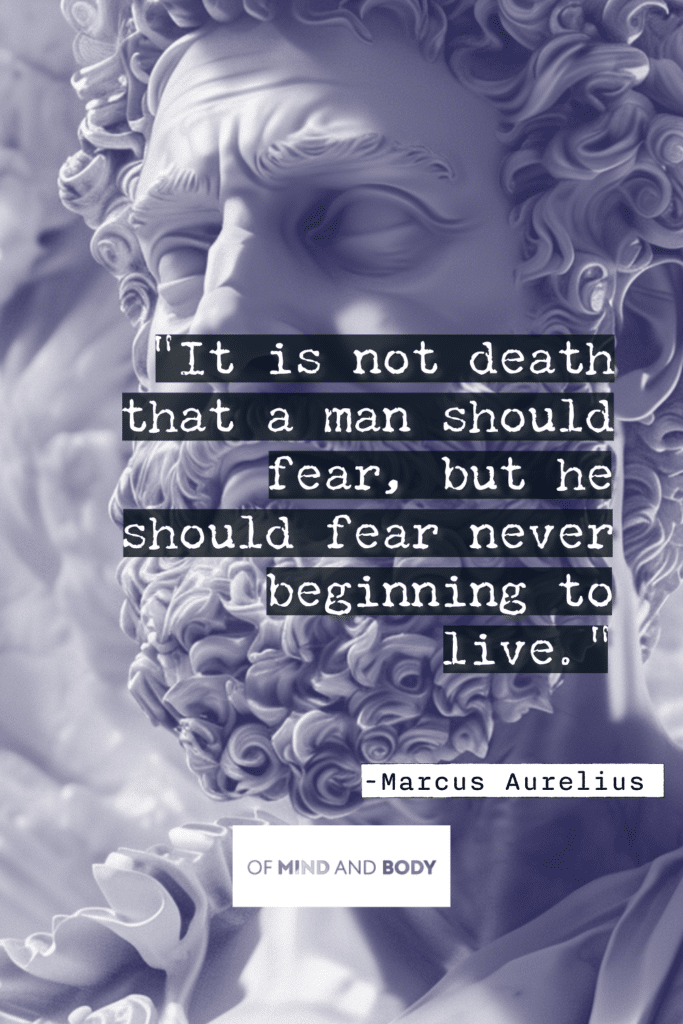
The Wisdom Behind the Words:
This quote by Marcus Aurelius emphasises the importance of living a meaningful life rather than fearing death. Aurelius suggests that the real fear should not be death itself, which is inevitable, but the fear of not having truly lived. This perspective aligns with Stoic philosophy, which advocates for living in harmony with nature and making the most of one’s existence through virtue and self-improvement.
Everyday Applications:
To apply this wisdom, focus on making the most of each day. Engage in activities that enrich your life and the lives of others. Embrace new experiences, learn continuously, and strive to be present in the moment. This approach encourages us to live fully, so that when we reflect on our lives, we can do so with the satisfaction of having truly lived, not merely existed.
“I cannot escape death, but at least I can escape the fear of it.”
Epictetus
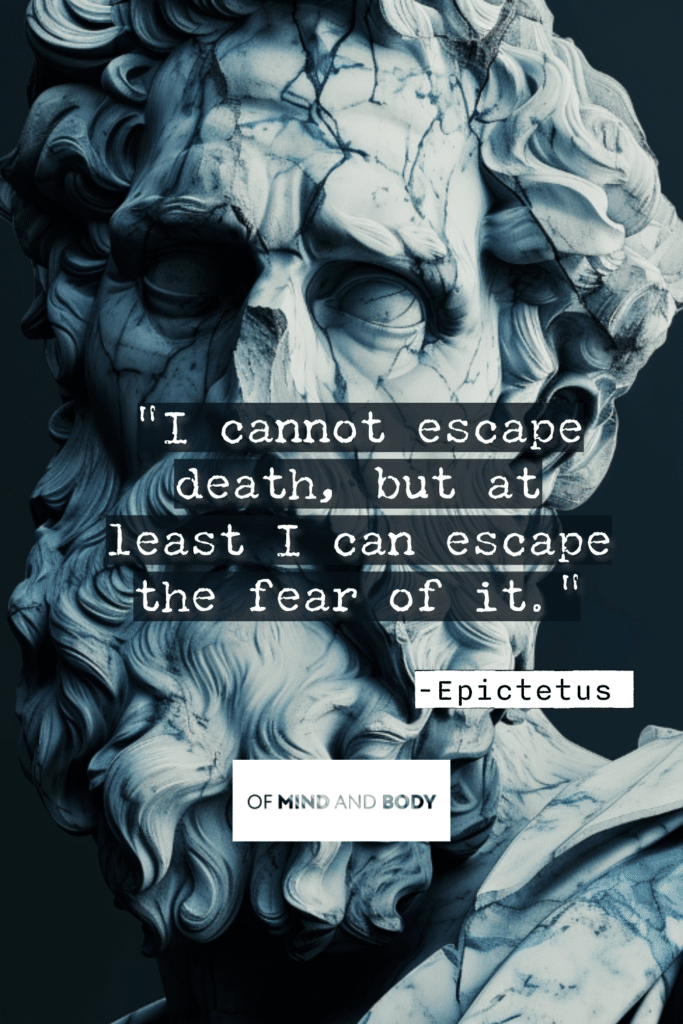
The Wisdom Behind the Words:
In his quotes, Epictetus, a prominent Stoic philosopher, acknowledges the inevitability of death while emphasising the power we hold over our own perceptions and reactions. He suggests that while death is a natural and unavoidable part of life, the fear of death is not. This perspective encourages an acceptance of death as a natural process, and a focus on controlling our internal reactions and emotions, which are within our power.
Everyday Applications:
To apply this wisdom, start by recognising and accepting that death is an inevitable part of life, and then focus on what you can control – your reaction to this reality. Cultivate a mindset of acceptance and peace regarding the end of life. By doing so, you can free yourself from the paralysing fear of death and live more fully, appreciating the present and focusing on what truly matters in life.
“The day which we fear as our last is but the birthday of eternity.”
Seneca
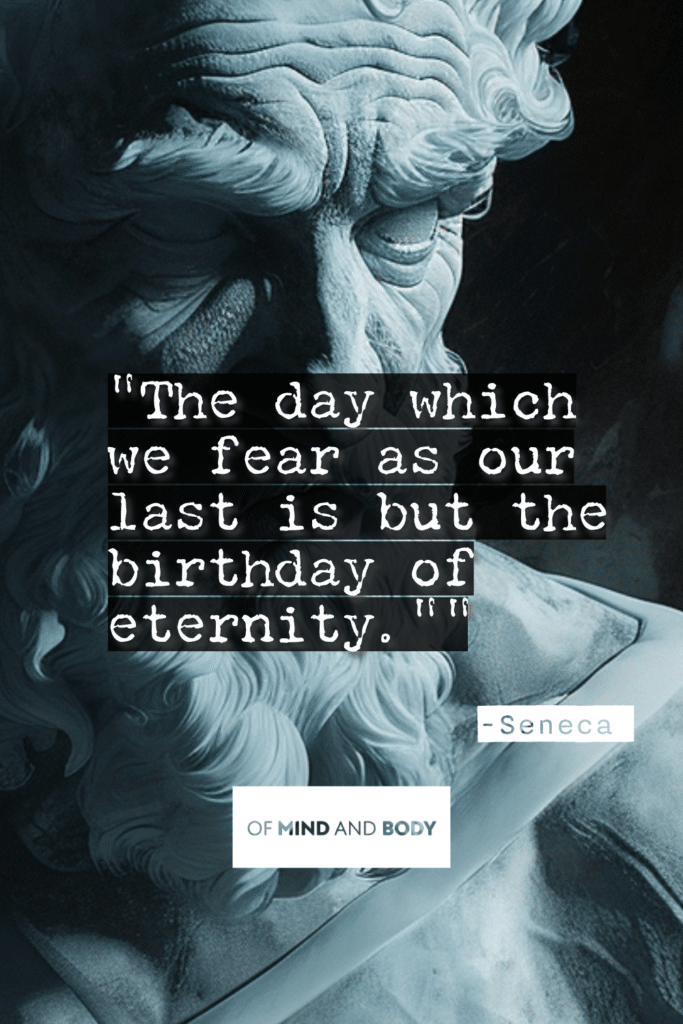
The Wisdom Behind the Words:
Seneca, the Stoic philosopher, presents a transformative view of death in his quotes. By referring to death as the ‘birthday of eternity,’ he re-imagines it as a beginning rather than an end. This perspective aligns with the Stoic belief in the natural order and cycle of life, where death is seen as a transition to a different state rather than a final cessation. It’s a reminder that our fears surrounding death often stem from our limited understanding of it.
Everyday Applications:
To embrace the wisdom of this quote in daily life, one can start by re-framing their perception of death. Instead of viewing it as a finality, consider it a natural, integral part of the life cycle. This shift in mindset can help reduce the fear of death and encourage a deeper appreciation for the present moment. It’s about finding peace in the continuity of life and existence, beyond our physical presence.
“Death smiles at us all, but all a man can do is smile back.”
Marcus Aurelius
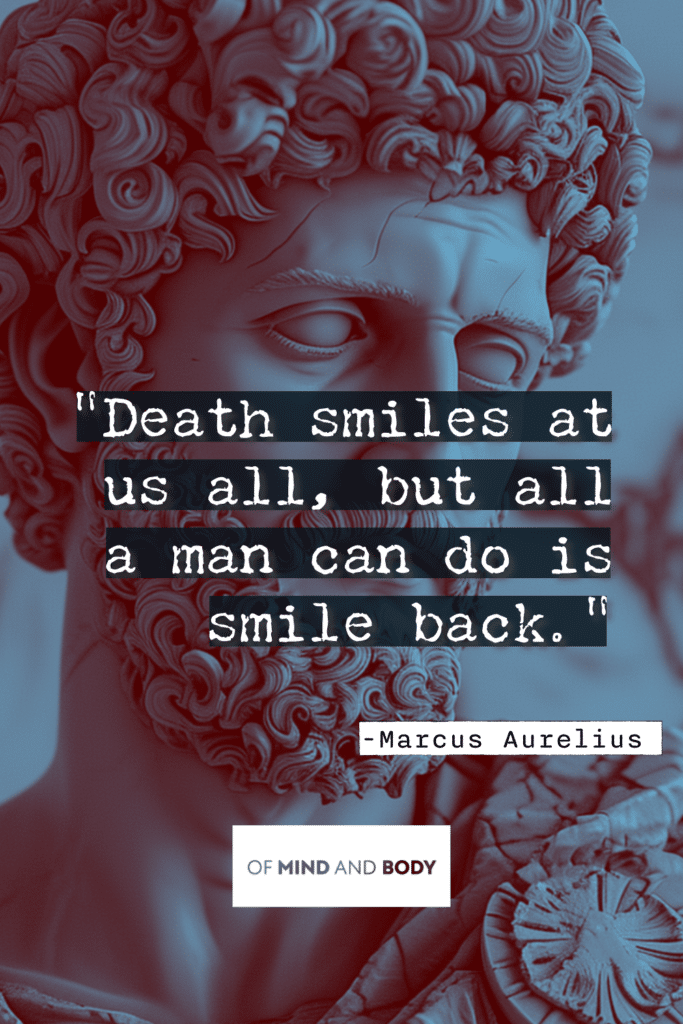
The Wisdom Behind the Words:
This quote by Marcus Aurelius personifies death as an omnipresent part of life, symbolised by its ‘smile.’ Aurelius suggests an attitude of acceptance and even camaraderie towards death. It reflects Stoicism’s core tenet of focusing on what we can control — our attitudes and responses. By smiling back at death, we acknowledge its inevitability and embrace the full spectrum of life, including its end.
Everyday Applications:
In everyday life, this quote inspires us to face our mortality with equanimity and courage. It’s about living life with a sense of humour and grace, even in the face of the inevitable. Practically, this could mean not allowing the fear of death to prevent us from taking risks or trying new experiences. It’s a call to live bravely, fully, and with a positive spirit.
“Death is nothing terrible, for if it were, it would have seemed so to Socrates.”
Epictetus
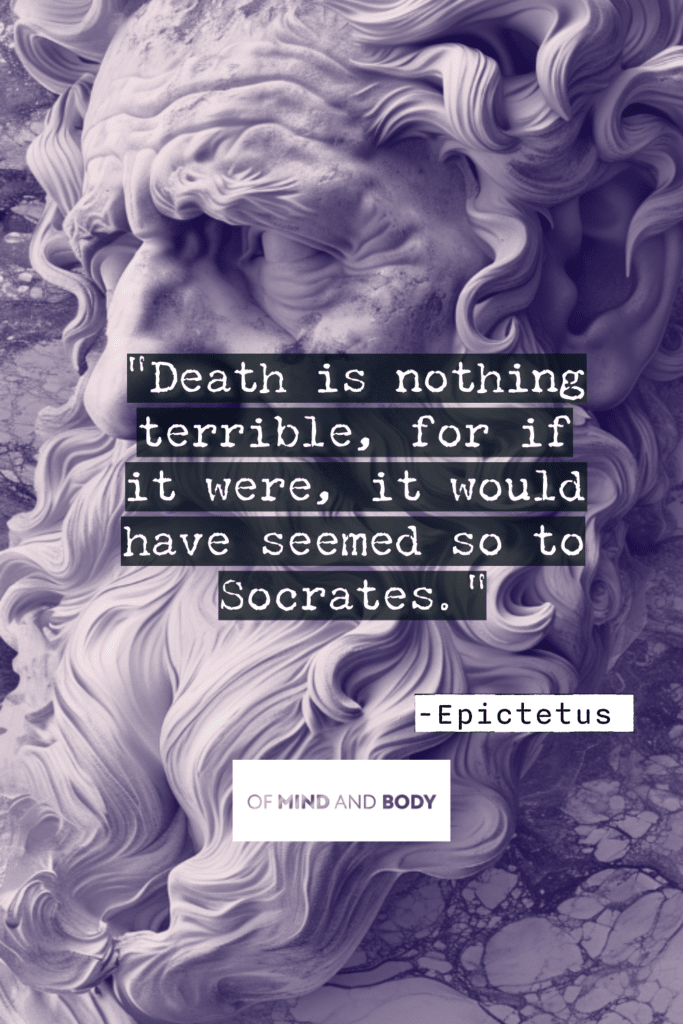
The Wisdom Behind the Words:
Epictetus brings forward a profound thought by referencing Socrates, one of the most revered philosophers in history. Socrates faced death with calmness and rationality, seeing it as a natural part of life. Epictetus implies that if someone as wise as Socrates did not view death as terrible, perhaps it isn’t. This quote reflects the Stoic belief in rationality and virtue as means to overcome fear, including the fear of death.
Everyday Applications:
In practical terms, this quote encourages us to adopt a rational and calm approach towards death. It suggests looking to role models who have faced their end with dignity and courage. Emulating such attitudes can help us reduce our own fears and anxieties about death, leading us to live more fully and with greater peace of mind, focusing on what is in our power to control – our actions and reactions.
“Think of yourself as dead. You have lived your life. Now, take what’s left and live it properly.”
Marcus Aurelius
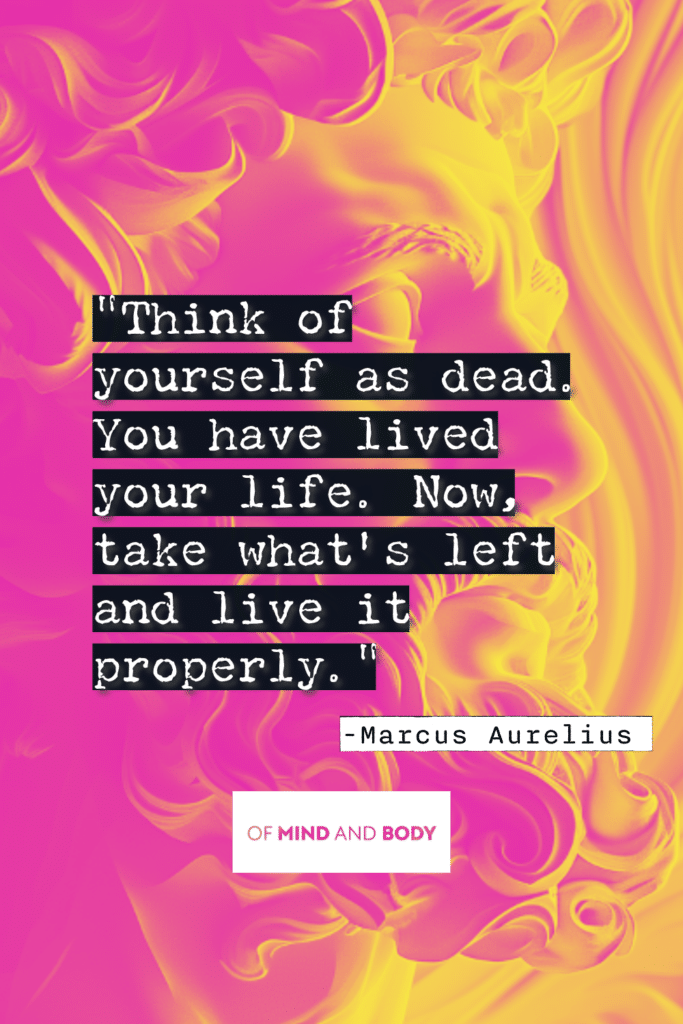
The Wisdom Behind the Words:
In this thought-provoking quote, Marcus Aurelius invites us to reflect on our mortality to gain perspective on how we live our lives. By imagining ourselves as already having died, we can look back and assess our life as if it were complete. This mental exercise is meant to inspire a sense of urgency and clarity about what is truly important, encouraging us to live the remainder of our lives with purpose and authenticity, aligned with our true values.
Everyday Applications:
Applying this wisdom in daily life involves regularly reflecting on our actions and choices as if we were looking back on our life. This can help us prioritise what truly matters, letting go of trivial concerns and focusing on meaningful goals and relationships. It’s about living each day with intention, making choices that align with our deepest values and contribute to a life well-lived.
Download your FREE Values and Beliefs handbook here…
“It is not that we have a short time to live, but that we waste a lot of it.”
Seneca
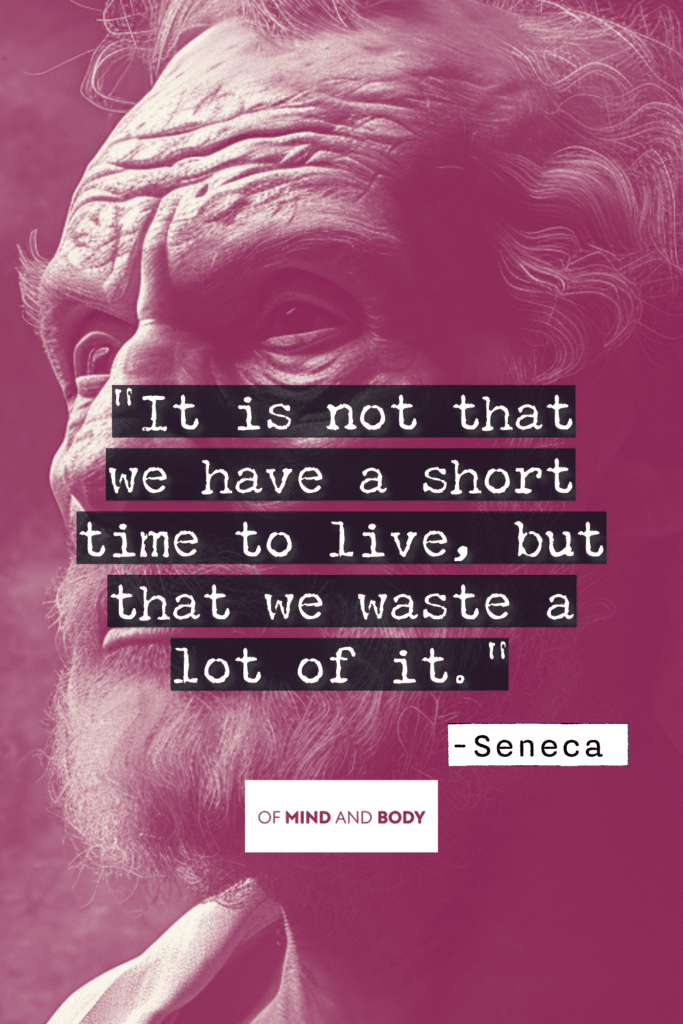
The Wisdom Behind the Words:
Seneca challenges the common lament of life being too short, suggesting that the problem lies more in how we choose to spend our time. This quote reflects the Stoic principle of focusing on what’s within our control — in this case, how we use our time. Seneca encourages us to live deliberately and purposefully, making the most of the time we have, rather than bemoaning its brevity.
Everyday Applications:
In practical terms, this wisdom teaches us to be mindful of how we spend our days. It’s about prioritising activities and pursuits that are meaningful and fulfilling, rather than getting lost in distractions or trivial matters. By being more intentional with our time, we can lead richer, more satisfying lives, filled with activities that align with our values and beliefs.
“It is not death or pain that is to be dreaded, but the fear of pain or death.”
Epictetus
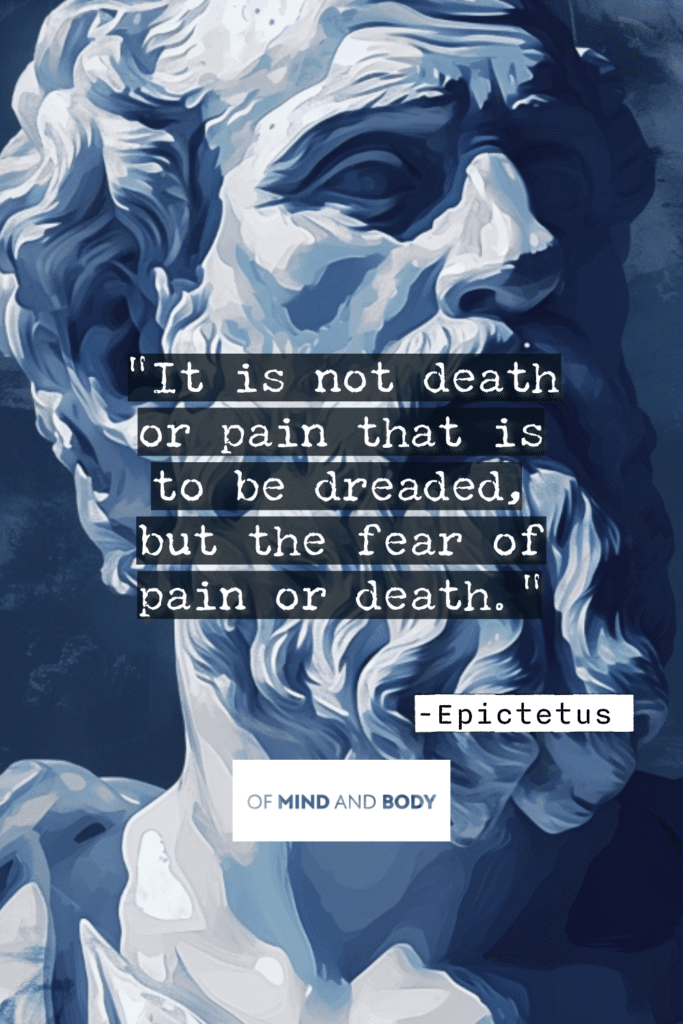
The Wisdom Behind the Words:
Epictetus, with these quotes, highlights a core Stoic belief: it’s not the external events (like death or pain) that disturb us, but rather our reactions and thoughts about these events. He suggests that the anticipation and fear of death or pain are often more debilitating than the experiences themselves. This reflects the Stoic emphasis on mastering our internal states and perceptions to live a more tranquil life.
Everyday Applications:
In daily life, this wisdom encourages us to focus on managing our thoughts and reactions. Instead of dreading or fearing future pain or the inevitability of death, we can train ourselves to accept these as part of the human experience. By doing so, we can reduce unnecessary suffering caused by fear and anxiety, and lead more composed and resilient lives.
“For what is it to die but to stand naked in the wind and to melt into the sun?”
Kahlil Gibran
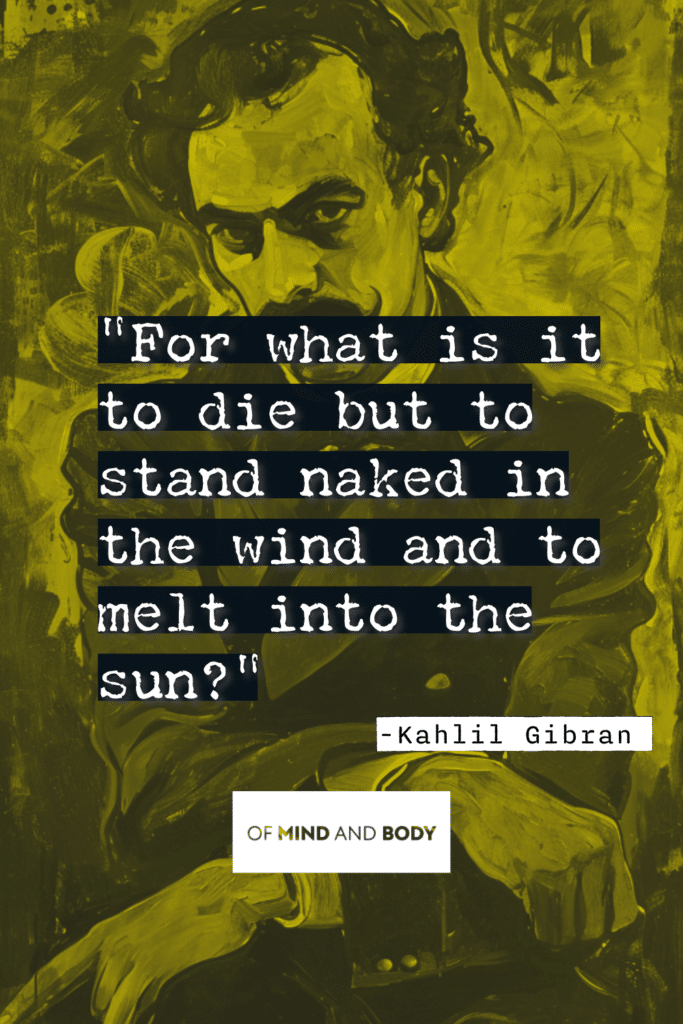
The Wisdom Behind the Words:
In this poetic reflection, Kahlil Gibran presents death not as an end, but as a return to the elements of nature. This quote embodies the Stoic view of death as a natural, harmonious process — a dissolution back into the universe from which we came. Gibran encourages us to view death not as something alien or fearsome, but as a natural, integral part of the cycle of life.
Everyday Applications:
This perspective can be applied in our lives by fostering a sense of unity with the natural world and a deep acceptance of life’s cycles, including our own mortality. It invites us to live in harmony with nature, embracing life and death as complementary forces. This view can bring a sense of peace and belonging, reducing the fear of death and helping us appreciate the transient beauty of life.
“Life, if well lived, is long enough.”
Seneca
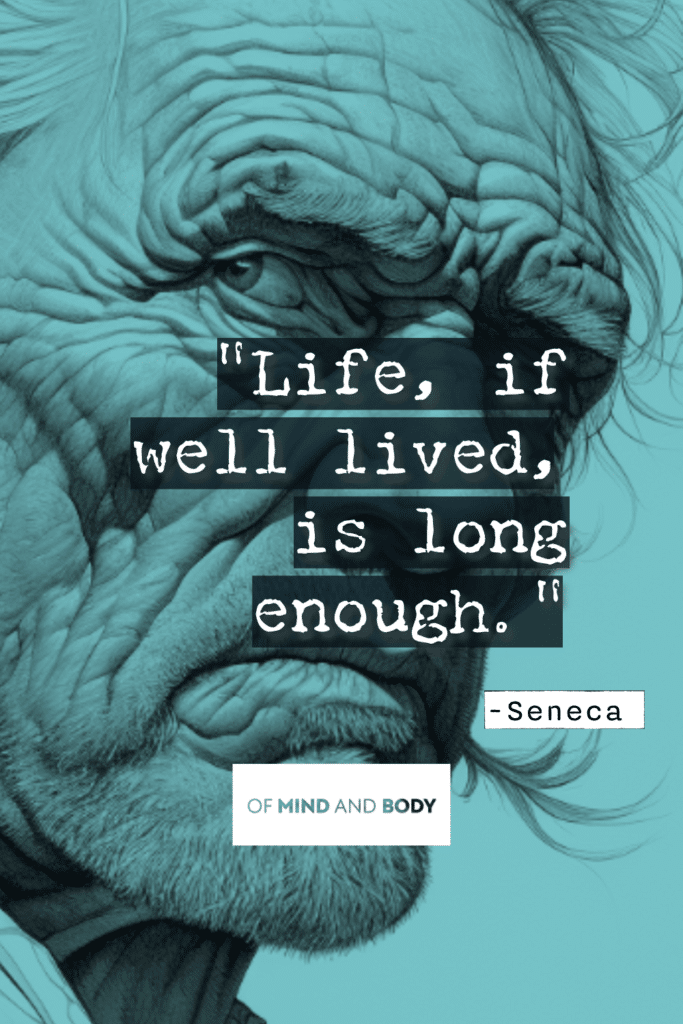
The Wisdom Behind the Words:
Seneca’s quote reflects the Stoic belief in the quality of life over its quantity. He suggests that a life filled with virtue, purpose, and fulfilment is sufficiently long, regardless of its actual duration. This quote underscores the importance of living in accordance with one’s values and making each moment count, rather than merely accumulating time.
Everyday Applications:
In everyday life, this wisdom can be applied by focusing on living meaningfully and with intention. It’s about making conscious choices that align with your values, pursuing activities that enrich your life and those around you, and savouring the present moment. By doing so, you can create a life that feels complete and abundant, irrespective of its length.
“You want to live – but do you know how to live? You are scared of dying – and, tell me, is the kind of life you lead really any different from being dead?”
Seneca
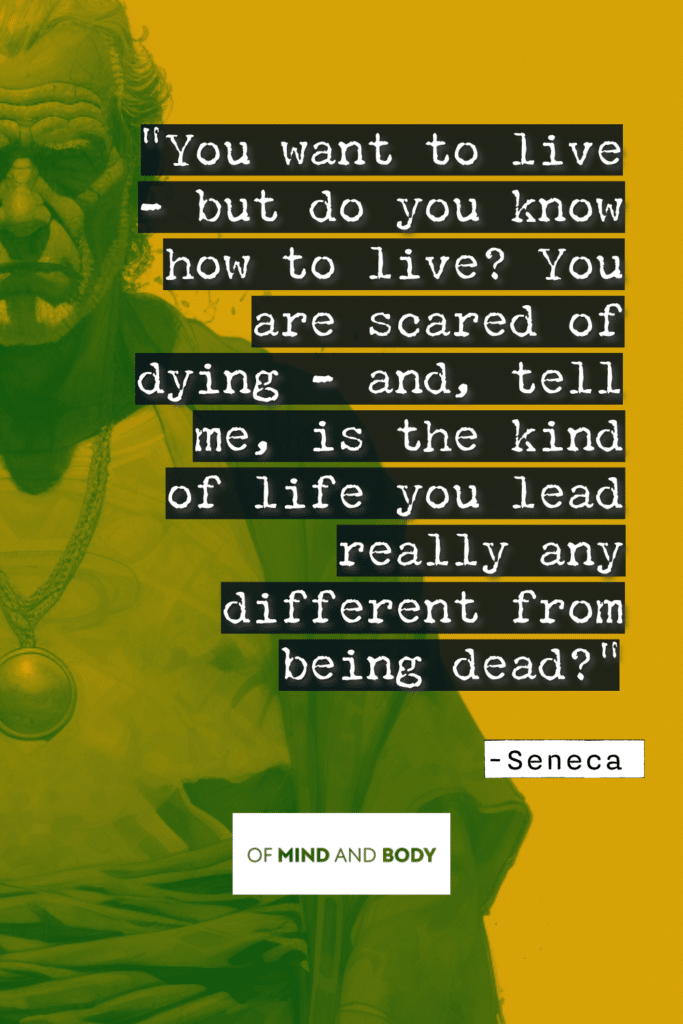
The Wisdom Behind the Words:
Seneca here challenges us to examine the quality of our living. He provocatively suggests that a life lived in fear, passivity, or without purpose might be akin to not living at all. This quote is a call to self–awareness and authenticity, urging us to live fully and actively, in a manner true to our deepest selves and values, rather than merely existing in a state of ‘living death.’
Everyday Applications:
Applying this wisdom means actively engaging in life, making choices that reflect our true selves, and not being paralysed by the fear of death. It encourages us to seek out experiences that bring us joy, growth, and fulfilment, and to actively participate in the world around us. Ultimately, it’s about ensuring that our lives are rich, vibrant, and meaningful, so we can confidently say we truly know how to live.
Final Thoughts
As we conclude our exploration of Stoic quotes on death, it’s clear that these ancient philosophies offer much more than mere contemplations on mortality. They provide us with a framework to live our lives with resilience, purpose, and tranquillity. By embracing the Stoic teachings, we learn to value the present, act with virtue, and view death not as a source of fear, but as a natural, integral part of our human journey.
These timeless insights encourage us to lead lives that are both meaningful and fulfilling, reminding us that the quality of our existence far outweighs its quantity. May these reflections on death inspire you to live a life rich in depth, character, and mindfulness.
Interested in delving deeper into the practical and transformative world of Stoicism?
Join our community by signing up for our newsletter, where you’ll receive regular insights, tips, and updates on how Stoic philosophy can enrich your everyday life. Additionally, don’t miss out on our ‘Introduction to Stoicism’ course – a journey designed to equip you with the tools and understanding to apply Stoic principles in modern times. Whether you’re seeking personal growth, mental clarity, or a new perspective on life, our course and community offer a welcoming space for exploration and learning. Sign up today and embark on a journey to a more fulfilled, serene, and enlightened life.



